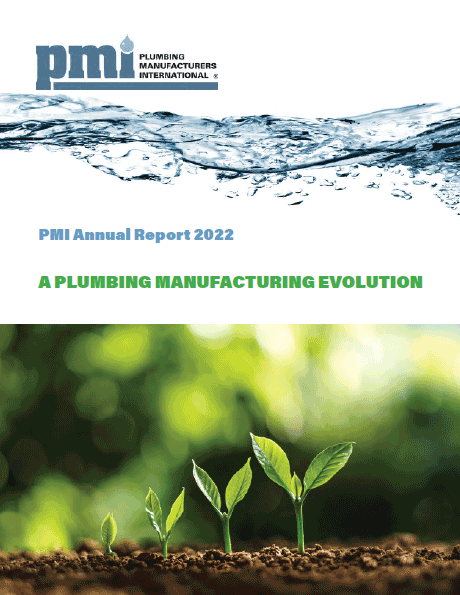Is the world better off because your company is in it?
The essential question heading our letter is one great companies are asking themselves. And we are all working for great companies, judging from the actions of Plumbing Manufacturers International member companies outlined in this report.
The question is one of the many asked in the book “Net Positive: How Courageous Companies Thrive by Giving More Than They Take” and in an associated Harvard Business Review article “The Net Positive Manifesto.” Both were written by Paul Polman and Andrew Winston. Their main premise is that corporations should strive to become “net positive” by improving the well-being of everyone they affect – every product, operation and stakeholder, including future generations and the planet itself.
They state that no company is net positive yet. But they provide many examples of companies that have started down the road toward net positive. In a similar fashion, this report provides evidence of PMI member companies making strides to reduce greenhouse gases and energy consumption and to become more diverse, equitable and inclusive organizations – all in ways that maintain or enhance their profitability.
Even before the term “net positive” was coined, PMI has worked to find solutions benefiting all water system stakeholders. PMI has always understood that the value of a toilet, showerhead or faucet is only as high as the quality of the water conveyed by it. As a result, PMI has always worked with the health and safety of water consumers in mind, knowing that their best interests are the same as ours.
As our CEO states in his letter on the next page, plumbing manufacturers have successfully fulfilled their traditional mission of providing safe and water-efficient plumbing products. Now, the time has come for us to expand our mission by joining efforts to meet the world’s great environmental and economic challenges.
We would like to personally thank all the individuals and PMI member companies who took the time to contribute to or be interviewed for this report. While each year this report and other PMI communications recognize many members, it’s impossible to mention all of the wonderful work and accomplishments of the PMI family. We thank all of you!
As always, we welcome your input on any of the tremendous challenges we face as an industry. We are proud of all of you and eagerly look forward to your achievements on many fronts in the future.
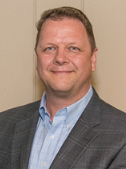 Martin Knieps
Martin Knieps
2022 President, PMI Board of Directors
Viega
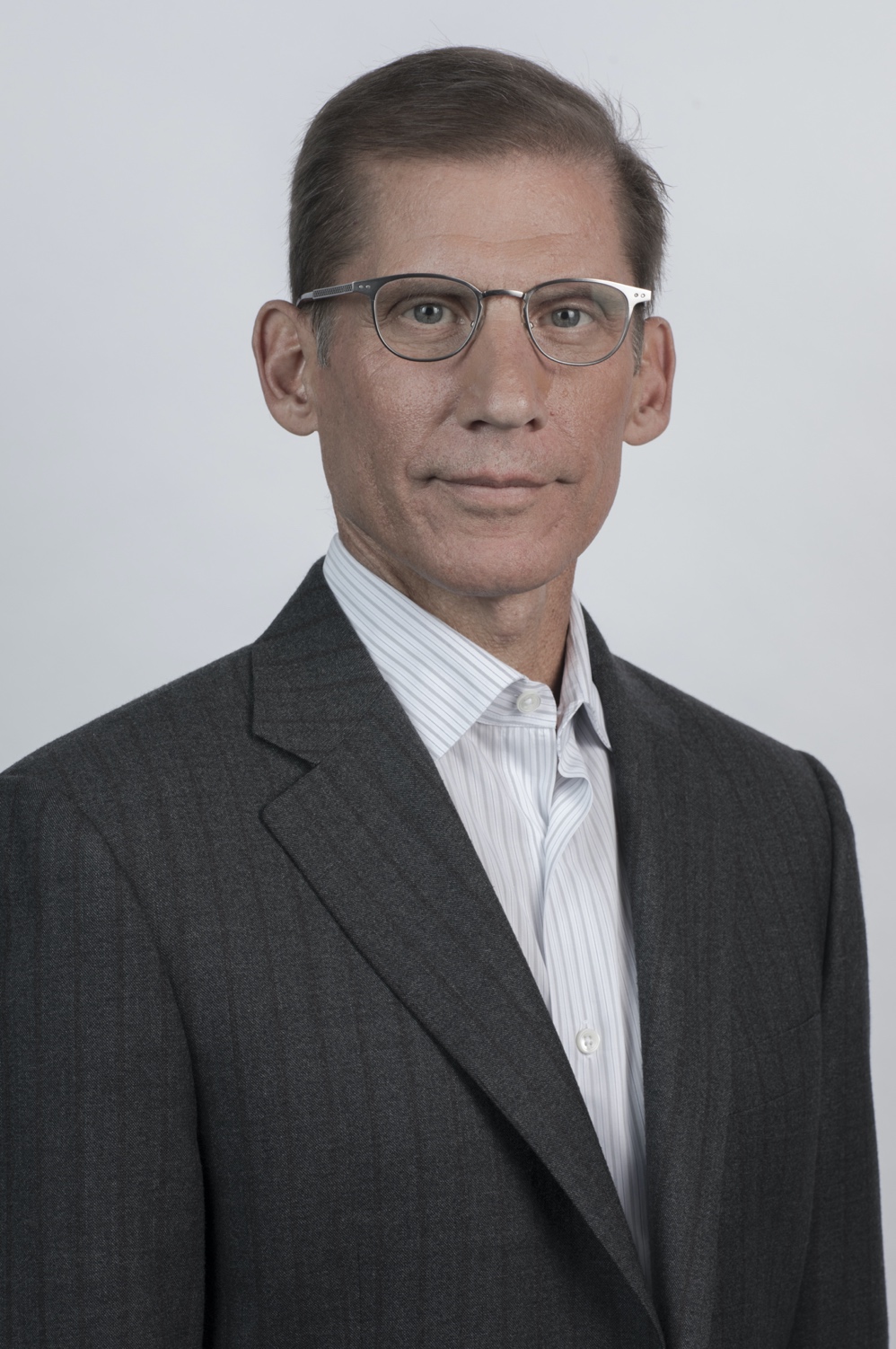 Todd Teter
Todd Teter
PMI Immediate Past President
House of Rohl
Making a safer, fairer and more prosperous world
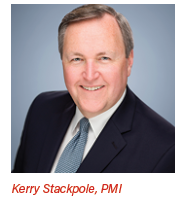
This year’s Plumbing Manufacturers International Annual Report is more than a summary of accomplishments. This 2022 report is a story, an account of our industry’s continued progress toward fulfilling a rapidly expanding social contract – one that includes commitments to lessen the impacts of climate change and to become a more diverse, equitable and inclusive industry.
As water supplies become threatened by a warmer and drier climate, our traditional mission of saving water through water-efficient plumbing products is expanding to include sustainability and waste reduction. Global supply chains – turned upside down by the COVID pandemic – must be reimagined with built-in flexibility and sustainability in mind.
And as the second-largest generation in history – baby boomers – moves into retirement, they must be replaced by individuals from the largest and third-largest generations – millennials and zoomers. These younger workers represent increased racial and gender diversity and bring new attitudes and preferences into the workplace.
This youth movement is joining with like-minded older workers to drive corporate commitments to climate change mitigation, as well as to diversity, equity and inclusion in the workplace.
According to the Edelman Trust Barometer, 60% of employees want their CEOs to speak out on controversial issues they care about, and 80% of the general population want CEOs to be personally visible when discussing public policy with external stakeholders or work their company has done to benefit society. In particular, CEOs are expected to shape conversation and policy on jobs and the economy (76%), wage inequity (73%), technology and automation (74%), and global warming and climate change (68%), the Edelman study says.
In this report, you will read about what PMI member companies are already doing to meet these challenges. What is covered in this report represents only a fraction of what our companies are doing, and what is coming in the future will be even greater.
PMI stands more ready than ever to assist our members in achieving success while responding to societal trends. Working behind the scenes each day, PMI brings valuable technical, advocacy and educational resources to bear for the benefit of our industry. This report attests to the ability of PMI and its members to make magnificent progress toward making the world a safer, fairer and more prosperous place.
Sincerely,
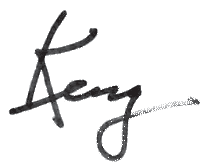
Kerry Stackpole
CEO and Executive Director
Plumbing Manufacturers International
Finding Sensible and Creative Ways to Reduce Waste
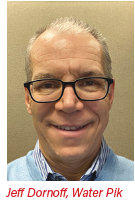 As Water Pik’s senior manager of regulatory and quality systems, Jeff Dornoff contributes to the sustainability initiatives of Church & Dwight – PMI member Water Pik’s parent company. In 2021, Water Pik’s showerhead business eliminated PVC packaging in favor of recyclable packaging materials and included How2Recycle labels on the majority of its packaging, according to the Church & Dwight’s 2021 sustainability report.
As Water Pik’s senior manager of regulatory and quality systems, Jeff Dornoff contributes to the sustainability initiatives of Church & Dwight – PMI member Water Pik’s parent company. In 2021, Water Pik’s showerhead business eliminated PVC packaging in favor of recyclable packaging materials and included How2Recycle labels on the majority of its packaging, according to the Church & Dwight’s 2021 sustainability report.
PMI member Haws Corporation took advantage of the popularity of its indoor and outdoor bottle fillers to both mitigate supply chain disruptions and reduce expenses. “In today’s COVID world, many people are hesitant touching buttons on drinking fountains,” Haws President and Chief Operating Officer Chuck Gruber remarked. Because the bottle filler is a top seller, Haws began ordering increased quantities of the raw materials needed for it and started producing a higher inventory to meet increased demand. This approach reduced raw material costs, supply chain snags, and both the amount and costs of the packaging. “A lot of people are doing that in the industry, finding creative ways to get around these kinds of supply chain issues,” Gruber stated.
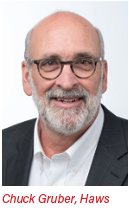 As the world took the first steps away from the COVID pandemic over the past 12 months, Plumbing Manufacturers International (PMI) member companies experienced supply chain disruptions, inflation, and a rapidly evolving workplace in the pandemic’s aftermath. While dealing with these changes, the industry continued to make progress against sustainability and waste reduction goals.
As the world took the first steps away from the COVID pandemic over the past 12 months, Plumbing Manufacturers International (PMI) member companies experienced supply chain disruptions, inflation, and a rapidly evolving workplace in the pandemic’s aftermath. While dealing with these changes, the industry continued to make progress against sustainability and waste reduction goals.
PMI members embrace the concept of extended producer responsibility
New legislation in various states focuses on the concept of extended producer responsibility, particularly regarding the reduction of packaging and single-use plastics. While PMI member companies innovate to reduce waste throughout their supply chains, they all have their own unique approaches to sustainability.
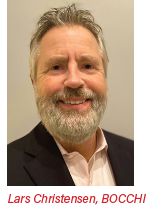 PMI member BOCCHI makes fireclay kitchen and bath sinks in kilns, a process that used to take about 30 hours of burning and baking. The company, which has all of its kitchen and bath manufacturing facilities located in Turkey, has shortened this time to about 16 hours, reducing its use of natural gas, said BOCCHI Director of Product Management Lars Christensen. BOCCHI has found ways to reduce the thickness of materials, recycle its discarded fireclay so that its products contain up to 3% of recycled product, and produce more sinks in the kilns simultaneously, he added.
PMI member BOCCHI makes fireclay kitchen and bath sinks in kilns, a process that used to take about 30 hours of burning and baking. The company, which has all of its kitchen and bath manufacturing facilities located in Turkey, has shortened this time to about 16 hours, reducing its use of natural gas, said BOCCHI Director of Product Management Lars Christensen. BOCCHI has found ways to reduce the thickness of materials, recycle its discarded fireclay so that its products contain up to 3% of recycled product, and produce more sinks in the kilns simultaneously, he added.
In other steps taken to meet sustainability goals, BOCCHI uses 100% recycled water in its manufacturing, reduced its use of plastic in favor of paper recyclable materials for packaging, and implemented a QR code system to reduce the amount of paper instructions and other materials, Christensen explained. He said IKEA is a major retailer of BOCCHI products in Europe. “IKEA is very green. We are audited each month by IKEA; so we are doing everything we can to reduce our carbon footprint, especially on packaging this year.”
PMI increases educational offerings about regulatory and market trends related to sustainability
Within the past 12 months, PMI organized PMI21 Manufacturing Success Conference presentations focused on industry and regulatory trends in plumbing plastics and on water efficiency during an era of growth and drought. PMI webinars covered topics including supply system design for peak water demand, how to finance packaging recycling and recovery, and microplastics and their potential health, regulatory and liability consequences. PMI also joined AMERIPEN (the American Institute for Packaging and the Environment) to gain additional insight and influence on state and federal bills related to single-use plastic and packaging.
“We’re sure we’ll see more legislation and regulatory actions relating to waste and sustainability in the future,” said PMI Board of Directors President Martin Knieps from Viega. “Through the PMI initiative to address climate change, PMI is developing a structure through which to act decisively on these issues for the benefit of our members.”
Today’s actions make ambitious goals achievable
Mission Moen, a sustainability commitment focused on helping preserve and protect water resources, set the ambitious goal in 2020 of enabling users of PMI member Moen’s products to save 1 trillion gallons of water by 2030. Last year, Moen expanded its mission through a second commitment – to recover and repurpose 2,000 tons of ocean plastic by 2030. “At Moen, part of our operating philosophy is to do what’s right, and a commitment to sustainability is a natural element of doing what’s right for our employees and for our world,” said Delphine Francois Chiavarini, vice president, global brand marketing, Moen.
In addition, Moen headquarters and laboratories recycle more than 90% of all metal, scrap, return product and manufacturing by-product, as well as all paper, glass, toner and printer cartridges, cardboard, plastic bottles and aluminum cans. The laboratories reduce water consumption by reusing 70% of all water used in product testing. Moen has installed water filtration systems in all facilities to reduce plastic bottle consumption and waste. And even doing little things – like setting printers to a default of two-sided printing – has significantly lowered paper use.
PMI member Sloan places a high priority on sustainability, and water conservation is a big part of that. Sloan’s Franklin Park, Illinois, headquarters has achieved a 97% landfill diversion rate as it works toward fully accomplishing its zero-landfill initiative by reusing, recycling, upcycling or donating materials, said Patrick Boyle, Sloan’s director of corporate sustainability. Sloan headquarters has also achieved certification to the Alliance for Water Stewardship Standard, a global framework for water stewardship certification. Sloan’s facility in India and joint venture in China are both LEED Silver certified, and the company’s newest office and showroom in Chicago is submitting for LEED and WELL certification.
PMI allied members do their part
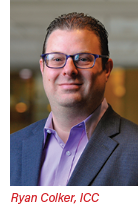 PMI’s allied members develop codes and standards to guide the construction of buildings that will use energy efficiently and minimize greenhouse gas emissions. For example, by continually updating these green building energy codes from year to year, PMI member International Code Council’s International Energy Conservation Code (IECC) residential requirements provided a 9.4% improvement in national energy savings and an 8.6% reduction in greenhouse gas emissions from 2018 to 2021, stated Ryan Colker, ICC’s vice president, innovation. “This translates into about $2,400 in yearly savings for an average residence,” he added.
PMI’s allied members develop codes and standards to guide the construction of buildings that will use energy efficiently and minimize greenhouse gas emissions. For example, by continually updating these green building energy codes from year to year, PMI member International Code Council’s International Energy Conservation Code (IECC) residential requirements provided a 9.4% improvement in national energy savings and an 8.6% reduction in greenhouse gas emissions from 2018 to 2021, stated Ryan Colker, ICC’s vice president, innovation. “This translates into about $2,400 in yearly savings for an average residence,” he added.
Through its Code on a Mission campaign, ICC has set a goal to get one-third of the country covered by a code that meets or exceeds the 2021 IECC by 2023. “Right now, we have about six million people covered by the 2021 IECC. We’re shooting for about 115 million,” Colker said. Help will come from the recently enacted Infrastructure Investment and Jobs Act (IIJA), which made $225 million available for energy code implementation.
PMI’s allied members also work with manufacturers to evaluate their products’ impact on the environment. Through environmental product declarations (EPDs), allied members verify products’ environmental performance according to a “cradle to grave” assessment of a product across all of its life stages – material extraction, production, transportation, installation, use, and end of life. PMI member manufacturers are fulfilling a growing interest in EPDs and health product declarations (HPDs) for plumbing products, and several of these manufacturers offer this documentation to green builders today.
After a long period of advocacy by PMI and its members and allies, California adopted industry standard NSF/ANSI/CAN 61 2020 as its lead-testing requirement for certified endpoint drinking water devices sold in California. The lead criteria for endpoint devices under the standard were revised by the Joint Committee on Drinking Water Additives – System Components, which was facilitated by PMI member NSF International. The standard reduces the allowable amount of lead leached during product testing five-fold – from the previously allowable Q ≤ 5 micrograms (mcg) to Q ≤ 1 mcg. One mcg is equal to one-millionth of a gram. By comparison, one grain of salt is 60 times larger than 1 mcg.
“Setting and meeting this industry standard is another example of how plumbing industry innovation assures that Americans receive a safe supply of drinking water,” said Kerry Stackpole, PMI CEO and executive director.
Supply Chain is ‘Another Train Coming’
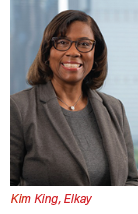 In response to a question about whether or not there’s a light at the end of the tunnel on supply chain delays, Kim King of PMI member Elkay Manufacturing Co. said one of her managers, Matt Lafrenz, put it best. “He said, ‘that light at the end of the tunnel is another train coming, just waiting for us.’” Undaunted, her company is one of many PMI member companies that have brought their supply chains closer to their manufacturing facilities and have developed contingency plans to make sure they get what they need.
In response to a question about whether or not there’s a light at the end of the tunnel on supply chain delays, Kim King of PMI member Elkay Manufacturing Co. said one of her managers, Matt Lafrenz, put it best. “He said, ‘that light at the end of the tunnel is another train coming, just waiting for us.’” Undaunted, her company is one of many PMI member companies that have brought their supply chains closer to their manufacturing facilities and have developed contingency plans to make sure they get what they need.
Set off by COVID and spiraling into virtually every aspect of business, supply chain quagmires have resulted in shortages and inflated prices on raw materials such as aluminum, nickel, copper, lumber and steel; labor shortages and wage increases up to 30% for some PMI members; longer wait times for electrical components and personal protective equipment (PPE); and freight delivery delays. PMI member companies have responded by moving from just-in-time inventories to having backup supplies and suppliers – and backups to backups.
Having some of the same supply chain issues as other PMI members, BOCCHI has its own unique challenges, as well. While many members work to bring their supply chains closer to their manufacturing facilities, BOCCHI already sources and produces its fireclay sinks exclusively in Turkey, where inflation recently has run as high as 55%, Christensen said. “Turkey is buying about 80% of its gas from Iran or Russia, I believe, and with all the trouble going on, it’s pretty hard,” he remarked. “I know our gas costs for the plant, where we have the fired kilns, is about five times higher this year than last year.”
While King describes the supply chain situation as being like an oncoming train, Haws Corporation’s Gruber sees it as a balloon. “If one place is out of line and gets pushed in, something else pops out the other side,” he stated. “We’ve seen quite a bit of delays and double-digit increases in costs of materials such as aluminum, paper, stainless steel and nickel. Some of that has to do with what is happening in Ukraine. Do we see any light at the end of the tunnel? I don’t see any in sight right now. Nothing’s moving back to where it was. Even if we do see some relief in one area, something else pops up.”
Speeding up product certification and increasing the flow of exports
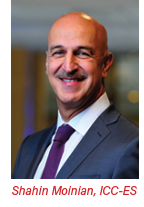 While PMI manufacturing members deal with supply shortages, PMI’s allied members are doing whatever they can to speed certifications needed to bring a product to market. For example, ICC-Evaluation Service’s robotic process automation (RPA) can reduce the certification process required for certain plumbing fixtures and fittings from days or weeks to sometimes “within seconds,” explained Shahin Moinian, ICC-ES president. “If there’s proof of compliance, a report is generated, and an email is shot to the client saying that the product has met requirements.” So far, ICC-ES has certified waterproofing membranes (ANSI A188-10) and temperature actuate mixing valves (ASSE 1017) with RPA and plans to provide RPA soon for more plumbing products, such as those covered in the scope of ASME A112.18.2/CSA B125.2. In addition, ICC-ES’s controlled conformity assessment allows manufacturers with facilities approved for product certification to conduct a good portion of the assessment at their own facilities, under the supervision of ICC-ES staff, expediting certification and product launch.
While PMI manufacturing members deal with supply shortages, PMI’s allied members are doing whatever they can to speed certifications needed to bring a product to market. For example, ICC-Evaluation Service’s robotic process automation (RPA) can reduce the certification process required for certain plumbing fixtures and fittings from days or weeks to sometimes “within seconds,” explained Shahin Moinian, ICC-ES president. “If there’s proof of compliance, a report is generated, and an email is shot to the client saying that the product has met requirements.” So far, ICC-ES has certified waterproofing membranes (ANSI A188-10) and temperature actuate mixing valves (ASSE 1017) with RPA and plans to provide RPA soon for more plumbing products, such as those covered in the scope of ASME A112.18.2/CSA B125.2. In addition, ICC-ES’s controlled conformity assessment allows manufacturers with facilities approved for product certification to conduct a good portion of the assessment at their own facilities, under the supervision of ICC-ES staff, expediting certification and product launch.
PMI member IAPMO was awarded a four-year grant from the U.S. Department of Commerce to work with U.S. manufacturers to increase the flow of plumbing exports to Southeast Asian countries by removing burdensome export requirements and technical barriers to trade. Through this funding, IAPMO will help to provide a more efficient testing and certification alternative for plastic pipes in Indonesia, easing the pathway for U.S. manufacturers to compete in government procurements and, by becoming a designated and recognized testing laboratory for sanitaryware in the Philippines, reducing the costs and burdens for U.S. exporters in the market.
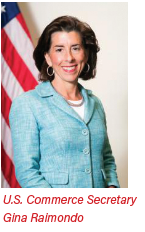 “IAPMO’s work in testing and standards aims to help navigate export pathways for U.S. companies while also cutting costs and relieving burdens for U.S. exporters in certain Indo-Pacific markets,” said U.S. Commerce Secretary Gina Raimondo. “This kind of innovation is crucial in recovering our economy and increasing competitiveness of American industries.”
“IAPMO’s work in testing and standards aims to help navigate export pathways for U.S. companies while also cutting costs and relieving burdens for U.S. exporters in certain Indo-Pacific markets,” said U.S. Commerce Secretary Gina Raimondo. “This kind of innovation is crucial in recovering our economy and increasing competitiveness of American industries.”
PMI provides advocacy and educational support on supply chain
PMI staff and government affairs representatives actively supported members by gaining assistance from federal and state government on issues relating to supply chain.
Three provisions actively supported by PMI were included in the America COMPETES Act passed by the U.S. House of Representatives. The act aims to enhance America’s global competitiveness by fixing broken supply chains, boosting scientific research, investing in STEM education programs, and more.
The three provisions are the Ocean Shipping Reform Act, National Institute of Standards and Technology (NIST) reauthorization, and the INFORM Consumers Act. A House-Senate conference negotiated the differences between the America COMPETES Act and the Senate’s United States Innovation and Competition Act.
“PMI advocated for these provisions because they will make supply chains involving ocean shipping more efficient, help the plumbing manufacturing industry assure safe and reliable plumbing systems to strengthen water quality and water efficiency, and protect shoppers from counterfeit or stolen merchandise,” Stackpole said.
At the PMI21 Manufacturing Success Conference, University of San Diego professor David Pyke, Ph.D., showed attendees how unexpected disruptions can ripple through the supply chain and other functional areas of a business.
Pyke said many companies are building redundancy into their supply chain plans by contracting with multiple suppliers located domestically, regionally and internationally. Some keep excess capacity or maintain multiple manufacturing facilities where one plant can produce standard products while another one can shift production to more specialized products if necessary.
Pyke advised using coordinated planning forecasting and replenishment (CPFR) to involve customers and suppliers in planning key supply chain activities to efficiently meet customer demand. CPFR is a set of practices that help streamline processes and supply chain planning while boosting inventory management.
“Giving your suppliers the decision rights to manage your inventory – by giving them daily sales information – can be a powerful thing,” Pyke said. Making information available to customers and suppliers can help provide advance warning of an unanticipated negative event that could impact your business, he added.
Product transparency leads to better environmental stewardship
Elkay has set improving product transparency as a near-term supply chain and sustainability goal, said King. “We have begun offering health product declarations on some of our products to provide our user community some insight into the materials that they would see in our products and interact with each day. It has allowed us to take a key step in product stewardship,” she explained.
By 2026, the company plans to have health product declarations on 80% of its products. Achieving this goal will require getting input from suppliers about what goes into their products, King explained. All Elkay suppliers must sign off on a code of conduct attesting to meeting safety requirements and not using child labor. “We’re adding a DEI element into that code of conduct as well,” King stated. “We firmly believe that diversity in our supply chain is going to bring about enhanced innovation and fresh ideas on how we perform as an organization.”
Transitioning into a Changing Workplace and Labor Market
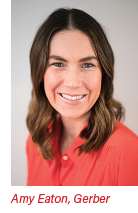 Faced with myriad workplace and labor issues sparked by the COVID pandemic, Amy Eaton directed PMI member Gerber Plumbing Fixtures’ human resources initiatives as the company transitioned into the new realities of working from home and a super-competitive labor market. Gerber decided to recognize and reward the “stars” who cannot work remotely for rallying the company and keeping it going during the pandemic while enabling employees not needed onsite each day to work at home three days a week. Eaton is Gerber’s director of human resources.
Faced with myriad workplace and labor issues sparked by the COVID pandemic, Amy Eaton directed PMI member Gerber Plumbing Fixtures’ human resources initiatives as the company transitioned into the new realities of working from home and a super-competitive labor market. Gerber decided to recognize and reward the “stars” who cannot work remotely for rallying the company and keeping it going during the pandemic while enabling employees not needed onsite each day to work at home three days a week. Eaton is Gerber’s director of human resources.
“What we learned over these last two years, and especially in the height of COVID, was that everyone was faced with major hurdles. They looked different for each person, so what was going on in my world was different than what may have been going on in another employee’s world. We had to learn to adapt, be increasingly supportive, and flexible in supporting those team members,” she stated.
As PMI member BrassCraft Manufacturing Co. worked to determine its remote work policy, it used employee surveys and various listening tools to learn why a hybrid-enabled environment is useful. What are the benefits of working together? What are the benefits of remote work? How does a company optimize for flexibility with either approach?
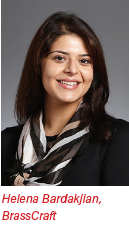 “We found over 90 percent of our employees want to work from home at least some of the time. But we also heard that employees want a space to connect, collaborate, innovate and ultimately engage with one another,” said BrassCraft employee experience specialist Helena Bardakjian. “So we’re re-looking at our workplace layouts because, if you think about it, most businesses were solely geared towards people coming to an office, plant or other facility, where everyone has a designated spot,” she explained. “That’s not going to promote the connective environment and collaboration that we want. We took time to revamp a few areas within our building, strategically designating them to drive an experience. Maybe it’s a space to focus, where you sit down and complete heads-down work. You’ll have a less cube-style individual space; however, you still feel like part of the BrassCraft community.”
“We found over 90 percent of our employees want to work from home at least some of the time. But we also heard that employees want a space to connect, collaborate, innovate and ultimately engage with one another,” said BrassCraft employee experience specialist Helena Bardakjian. “So we’re re-looking at our workplace layouts because, if you think about it, most businesses were solely geared towards people coming to an office, plant or other facility, where everyone has a designated spot,” she explained. “That’s not going to promote the connective environment and collaboration that we want. We took time to revamp a few areas within our building, strategically designating them to drive an experience. Maybe it’s a space to focus, where you sit down and complete heads-down work. You’ll have a less cube-style individual space; however, you still feel like part of the BrassCraft community.”
Bardakjian’s BrassCraft colleague Mahesh Cheerla emphasized the two-way collaboration between leadership and employees in determining how to best work together in the post-COVID environment. “We engaged everybody,” he stated. “It’s not something that we are mandating or making decisions from the top. It’s highly collaborative, and those efforts are paying out, with health and safety as the top priorities.”
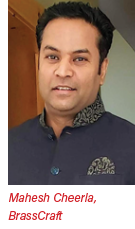 The many technological advancements available to companies are rapidly changing the workplace. PMI member companies are making this technology, as well as some benefits, available to all employees, including hourly and shopfloor staff, to allow them access to the same communications, tools and resources as management-level employees. These efforts are improving equity and inclusion within companies. For example, BrassCraft and another PMI member, Delta Faucet Co., have 401(k) matching programs for hourly employees.
The many technological advancements available to companies are rapidly changing the workplace. PMI member companies are making this technology, as well as some benefits, available to all employees, including hourly and shopfloor staff, to allow them access to the same communications, tools and resources as management-level employees. These efforts are improving equity and inclusion within companies. For example, BrassCraft and another PMI member, Delta Faucet Co., have 401(k) matching programs for hourly employees.
Remote work options a must for many job candidates
Patti Demitros, Elkay Manufacturing Co.’s director of organizational development and talent management, said the company’s hiring managers have discretion over whether or not an employee can work virtually or in a hybrid situation. She stated, however, that it’s becoming harder to source people without offering those options.
Eaton agrees in regard to working from home. “If you have team members who can do their jobs remotely, you need to be offering some work from home options through some capacity to be competitive,” she emphasized. “The second you do that, your talent just opens up. So the second I say to somebody, ‘you only need to be in this building two days a week,’ that opens my (recruiting) radius another, let’s say 20 miles, because somebody’s willing to drive further knowing they’re coming into an office only two days a week.”
Gruber said Haws Corporation considered its already established flexible scheduling and work culture as a major benefit for the employees of this women-owned business. “Full remote got turned on like a light switch when we went into COVID in March 2020. Now, it’s an even bigger part of our work environment and culture. You can’t tell people that they can’t work from home. They certainly can. They’ve done it for the last year and a half.”
High labor costs, however, are causing Haws and other PMI member companies to take a closer look at automation. “When you have a 30% increase in labor in one year, automation ideas that never made it past the whiteboard, all of a sudden, are now looking favorable,” Gruber explained. “But on the flip side, the cost to do automation has gone up, as well. The lead time to get automation equipment is substantial. So, you have those kinds of balances back and forth all the time.” He added that investments into automation tend to have good returns. “I clearly have been driving automation more into the workforce to free up staffing for other work.”
Lie Wang, a senior manager of manufacturing techniques and cost management for PMI member Hansgrohe, came to the U.S. from China to work on a six-month manufacturing and automation project for Delta Faucet Co., according to a Delta blog article. Lie had experience at Hansgrohe-Shanghai helping to automate manufacturing processes that had previously been completed manually, which saved money and time. Lie’s assignment in the U.S. was to “identify automation opportunities within Delta’s manufacturing environment; create business cases for connected equipment, visualization and automation; and help implement capital equipment projects regarding automation,” stated the article.
Workplace evolves as DE&I gains momentum
A question raised by an increasing number of job candidates, especially younger workers, relates to a company’s commitment to DE&I. Elkay is committed to a focus on recruiting diverse talent, Demitros stated, adding that five employee groups advocating diversity were formed in the last year and a half. “And we’re definitely looking at succession planning and talent,” she said. “Do we have the right number of diverse candidates in our program? Are we looking at the right number of diverse candidates for promotional opportunities? Are we identifying the right number of candidates for successor roles?”
Elkay began its DEI Council two years ago as part of an effort to position the company as an inclusive employer of choice. King, who also serves as the leader of this council, said the company has set goals for women and minority candidates, interviews, hires, promotion and leadership, all kept track of on the company’s quarterly DEI scorecard.
The council also recommended hiring a supplier diversity manager, King said. “For 2022, we set a target of 3.5 percent diverse suppliers. We’re defining as either minority business enterprise, women-owned, LGBTQ, small business enterprise, or veteran-owned business enterprise at this point, and we have surpassed that goal,” she explained.
PMI’s DE&I initiative began last year to develop more diverse engagement within the association and to guide members in forming and reaching their own goals for diversity, equity and inclusion. At the PMI21 Manufacturing Success Conference, keynote speaker Risha Grant provided insights on how to accomplish lasting DE&I success.
One way is to self-educate and get to know people based on your own experiences – not from those imprinted on you by your family, friends and the media, she said. Once you identify your biases, start seeking people who fit those biases, then take them out for coffee and get to know them, she suggested. Start with colleagues who seem to get overlooked in meetings or who don’t speak up. Grant asked, “Who is on your team that you can become an ally for – that you can help give a voice to?”
To encourage DE&I, Water Pik’s parent company Church & Dwight has several pages devoted to this topic on its Connect website for employees. In addition to a diversity statement, the company includes information about the various dimensions of diversity and quick links to pages on supplier diversity, its DE&I Council, and ways to get involved, Dornoff said.
Showing DE&I progress at the very top of the organization
Eaton said Gerber’s senior leadership team is 42% female, with representation from three different multinational ethnic groups. She said this gender diversity would place Gerber in the top 5% of companies surveyed for a recent “Diversity wins” report by McKinsey and Co. The report stated that companies in the first quartile of gender diversity on executive teams were 25% more likely to experience above-average profitability than peer companies in the fourth quartile.
According to Heidrick and Struggles Board Monitor 2022, Fortune 500 boards of directors continue to diversify, with a record number of seats (45%) going to women in 2021. The share of seats held by Black directors held steady at 26% in 2021 after a sharp rise from 10% to 28% in 2020; other people of color are still heavily underrepresented on these boards.
As PMI member companies add diversity to their boards and leadership teams, they have opportunities to gain new perspectives, as well as experience in areas such as sustainability and cybersecurity.
“We’ve often discussed the concept of our industry’s ‘social contract’ at PMI meetings,” Stackpole stated. “We have fulfilled our social contract in regard to providing safe plumbing and water very well. Now, we find ourselves at a time when our social contract is being extended into areas such as climate change mitigation and diversity, equity and inclusion. Governments, business partners and consumers are keeping watch over our collective progress. It’s PMI’s job to keep our members informed about society’s expectations and offer them tools and resources to enable their continued progress.”
Individuals Honored at PMI21 Manufacturing Success Conference
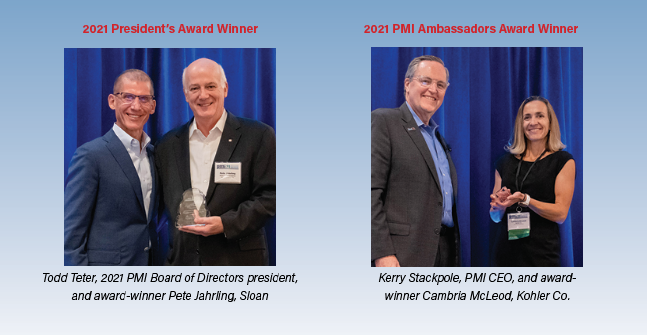
Make Your Voice Heard through Participation in PMI Committees
Advocacy/Government Affairs
Co-Chairs: Lowell Lampen, Kohler Co., and
Troy Benavidez, LIXIL
Allied Member Committee
Chair: Anish Desai, IAPMO
Commerce
Co-Chairs: Elton Perkins, Fluidmaster, Inc., and
Liz Renfro, Delta Faucet Co.
Technical
Co-Chairs: Ned Dickey, Hansgrohe, and
C.J. Lagan, LIXIL
Water Efficiency and Sustainability
Chair: Will Wang, Fluidmaster, Inc.
2022 PMI Board of Directors
President: Martin Knieps, Viega LLC
Vice President: Sal Gattone, LIXIL
Secretary-Treasurer: Chip Way, Lavelle Industries, Inc.
Immediate Past President: Todd Teter, House of Rohl
Daniel Gleiberman, Sloan Valve Co.
Cambria McLeod, Kohler Co.
Bob Neff, Delta Faucet Co.
Belinda Wise, Kerox, Ltd.
Strategic Advisory Council
Graham Allen, Sloan Valve Co.
Shawn Oldenhoff, Kohler Co.
Ken Roberts, Delta Faucet Co.
William Strang, TOTO USA
Claude Theisen, T&S Brass and Bronze Works
PMI Staff
Kerry Stackpole, FASAE, CAE, CEO/Executive Director
Jodi Stuhrberg, Director of Programs and Administration
Kyle Thompson, Technical Director
Stephanie Lass, Education Coordinator
Ann Geier, Administrative Assistant
2022 PMI Events
PMI CEO Thinking Forum | Sept. 8, George Washington Leadership Institute, Mount Vernon, Virginia
PMI Aspiring Leaders Program | Oct. 24, Muhammed Ali Center, Louisville, Kentucky
PMI22 Manufacturing Success Conference | Oct. 24-27, Omni Hotel, Louisville, Kentucky




